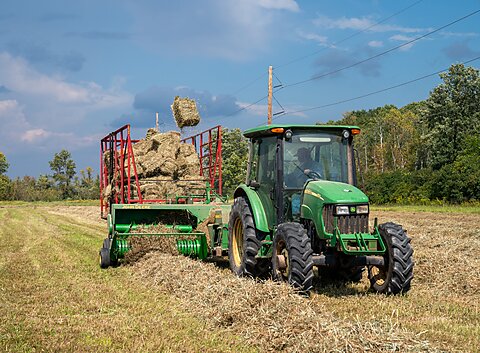Chris Edwards
Congress may consider a farm bill in coming months, which provides an opportunity for the two parties to come together on spending reforms. Republicans and Democrats should be able to agree that millionaire farmers do not need taxpayer subsidies.
Cato held a Capitol Hill forum last week on the economics of farm subsidies. The keynote speaker was Vincent Smith, director of agricultural policy studies at AEI and professor emeritus at Montana State University. The following are some excerpts from Vince’s comments on the need for farm program reforms.
Vince discussed the complexity of the farm bill and the power of special interests to set the agenda.
There are quite literally hundreds of programs and thousands of rules and regulations … The extraordinary complexity of the farm bill makes it easy for vested self‐interest groups—such as the Farm Bureau, national agricultural commodity associations, private insurance companies, agribusinesses, and environmental groups—to persuade congressional members to put in provisions that serve their own interests.
In many cases, these provisions come at the expense of the nation as a whole by encouraging the wasteful use of resources, government spending in excess of the benefits accruing to the farm sector, and the redistribution of income to wealthy households from average taxpayers. The federal crop insurance program is the poster child for such wasteful initiatives.
Vince then discussed how federal crop subsidies are not crucial to the farm economy. If subsidies were repealed, there would be modest improvements in efficiency and America’s farm production would continue apace.
[The rationale for crop subsidies] is the claim asserted by some legislators that the U.S. farm economy and agricultural production will collapse and U.S. consumers will face the threat of significant food insecurity if programs that provide subsidies to farmers go away or are funded at a lower level.
This claim is unambiguously incorrect. Multiple studies have found that most farm income safety net subsidies have relatively small impacts on the production of most commodities. With one exception, they also have very small impacts on the amount of land used for crop production. To the extent that the subsidies bring new land into production, which is the case for the crop insurance program, that land is of relatively poor quality, fragile, and subject to soil erosion and other degradation (including increased carbon emissions) when moved out of grazing land, pasture, or forestry.
To see why this is the case, consider that apart from three recent years—2018, 2019, and 2020—such government subsidies provide exceptionally modest shares of total farm revenues from all sources including market sales and government subsidies. Further, subsidies translate rapidly into higher land prices, as peer‐reviewed quantitative research has consistently demonstrated. This creates the associated problem of increasing the costs of entering farming for new, often younger farmers.
To repeat, there is no credible content to claims that the farm sector and agricultural production would collapse if farm income safety net programs, including the federal crop insurance program, were to go away.
If anything, the evidence points the other way. Current farm subsidy programs allow poorly managed, inefficient farms to survive for long periods of time, inhibiting the transfer of those resources to more efficient and productive operations, which are also likely to be more environmentally responsible. The case study that supports this conclusion is the well‐documented and substantially positive productivity impacts of ending farm subsidy programs in New Zealand.
Vince also tackled “the claim that farm subsidies are essential for the survival of the family farm, which is a major appeal to the heart and purse strings of the public.” He finds that the vast majority of American farms are family farms, including most of the largest farms in the nation. The largest farms receive the great bulk of federal subsidies even though these farms are in top financial shape and do not need taxpayer handouts.
Over 97 percent of all farms in the United States are family farms, and that includes the overwhelming majority of such businesses often described as factory or corporate farms, which in terms of production are in the largest 10 percent of all farms. Those farms produce over 50 percent of all output and receive about 60 percent of all subsidies, as documented by AEI scholars and other researchers using USDA survey data. Large farms have low levels of debt and substantial assets, and they can readily access loans when commodity prices are lower than expected or crop yields are low because of adverse weather. Absent farm subsidies or the federal crop insurance program, large farms face almost no risk of going out of business because of year‐to‐year variations in farm income.
Mid‐sized and small commercial farms that produce about 10 percent of U.S. agricultural output likely face more financial risks, but they get very little from price and income support programs. For example, under the crop insurance program, median‐sized farms that use crop insurance receive about $2,500 a year in subsidies, while farms in the largest 10 percent receive over $70,000, on average, and the very largest farms (the top 1 percent) receive hundreds of thousands of dollars. That pattern is replicated in other farm income support initiatives, and initial research indicates the same holds true for the large conservation programs.
Vince Smith provides extensive analyses of agricultural programs and farm subsidies on his AEI webpage.
Scott Faber of the Environmental Working Group also presented at the Cato forum. His commentaries on farm programs are available here.
I echoed many of Vince’s and Scott’s points about crop subsidies at the forum, but I also pointed to foreign food aid as another area for budget reforms.

